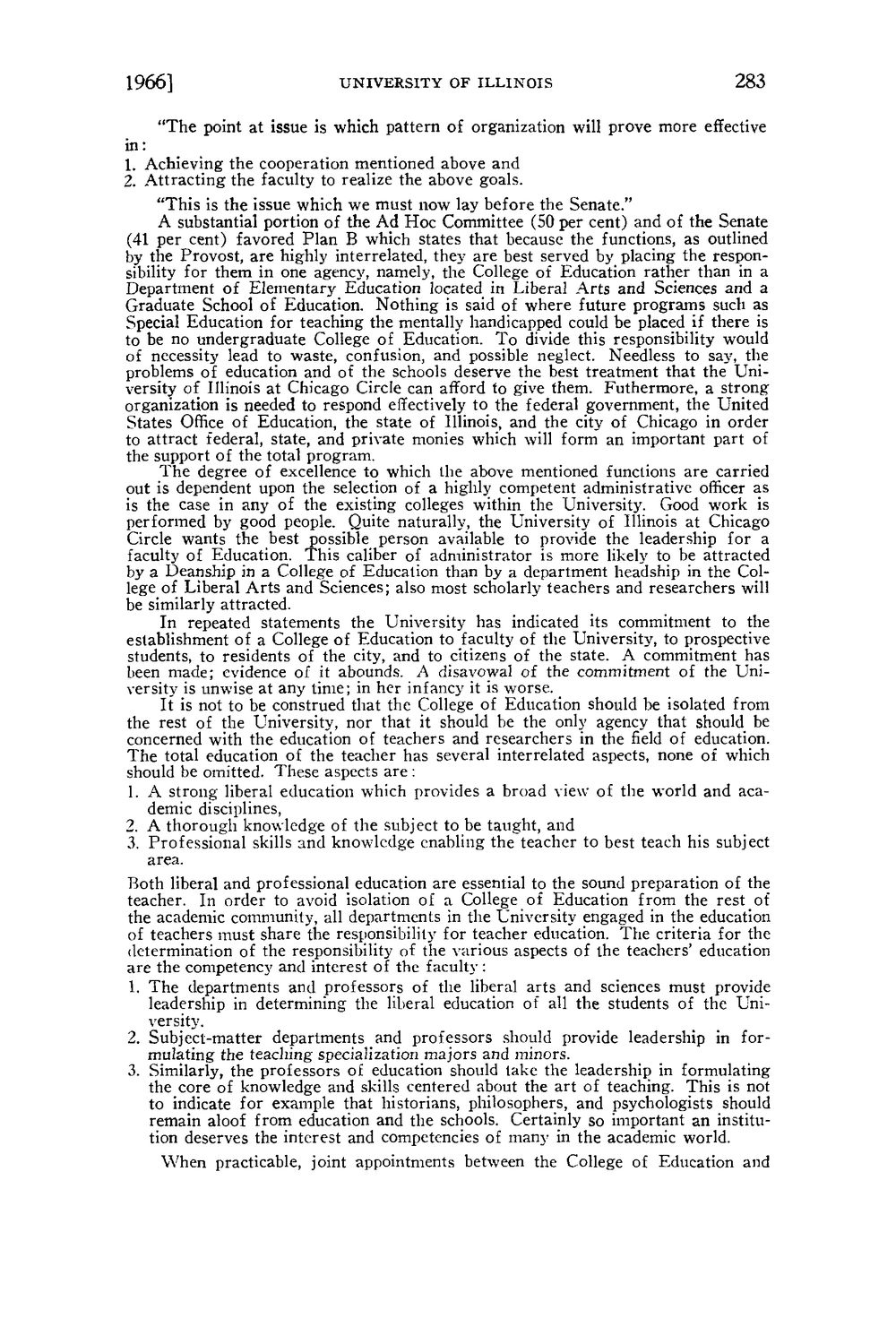| |
| |
Caption: Board of Trustees Minutes - 1968
This is a reduced-resolution page image for fast online browsing.

EXTRACTED TEXT FROM PAGE:
1966] U N I V E R S I T Y OF I L L I N O I S 283 "The point at issue is which pattern of organization will prove more effective in: 1. Achieving the cooperation mentioned above and 2. Attracting the faculty to realize the above goals. "This is the issue which we must now lay before the Senate." A substantial portion of the Ad Hoc Committee (SO per cent) and of the Senate (41 per cent) favored Plan B which states that because the functions, as outlined by the Provost, are highly interrelated, they are best served by placing the responsibility for them in one agency, namely, the College of Education rather than in a Department of Elementary Education located in Liberal Arts and Sciences and a Graduate School of Education. Nothing is said of where future programs such as Special Education for teaching the mentally handicapped could be placed if there is to be no undergraduate College of Education. To divide this responsibility would of necessity lead to waste, confusion, and possible neglect. Needless to say, the problems of education and of the schools deserve the best treatment that the University of Illinois at Chicago Circle can afford to give them. Futhermore, a strong organization is needed to respond effectively to the federal government, the United States Office of Education, the state of Illinois, and the city of Chicago in order to attract federal, state, and private monies which will form an important part of the support of the total program. T h e degree of excellence to which the above mentioned functions are carried out is dependent upon the selection of a highly competent administrative officer as is the case in any of the existing colleges within the University. Good work is performed by good people. Quite naturally, the University of Illinois at Chicago Circle wants the best possible person available to provide the leadership for a faculty of Education. This caliber of administrator is more likely to be attracted by a Deanship in a College of Education than by a department headship in the College of Liberal Arts and Sciences; also most scholarly teachers and researchers will be similarly attracted. In repeated statements the University has indicated its commitment to the establishment of a College of Education to faculty of the University, to prospective students, to residents of the city, and to citizens of the state. A commitment has been made; evidence of it abounds. A disavowal of the commitment of the University is unwise at any time; in her infancy it is worse. It is not to be construed that the College of Education should be isolated from the rest of the University, nor that it should be the only agency that should be concerned with the education of teachers and researchers in the field of education. The total education of the teacher has several interrelated aspects, none of which should be omitted. These aspects are : 1. A strong liberal education which provides a broad view of the world and academic disciplines, 2. A thorough knowledge of the subject to be taught, and 3. Professional skills and knowledge enabling the teacher to best teach his subject area. Both liberal and professional education are essential to the sound preparation of the teacher. In order to avoid isolation of a College of Education from the rest of the academic community, all departments in the University engaged in the education of teachers must share the responsibility for teacher education. The criteria for the determination of the responsibility of the various aspects of the teachers' education are the competency and interest of the faculty : 1. The departments and professors of the liberal arts and sciences must provide leadership in determining the liberal education of all the students of the University. 2. Subject-matter departments and professors should provide leadership in formulating the teaching specialization majors and minors. 3. Similarly, the professors of education should lake the leadership in formulating the core of knowledge and skills centered about the art of teaching. This is not to indicate for example that historians, philosophers, and psychologists should remain aloof from education and the schools. Certainly so important an institution deserves the interest and competencies of many in the academic world. When practicable, joint appointments between the College of Education and
| |